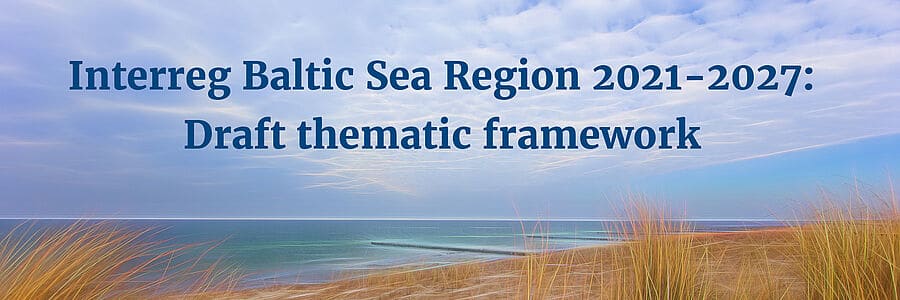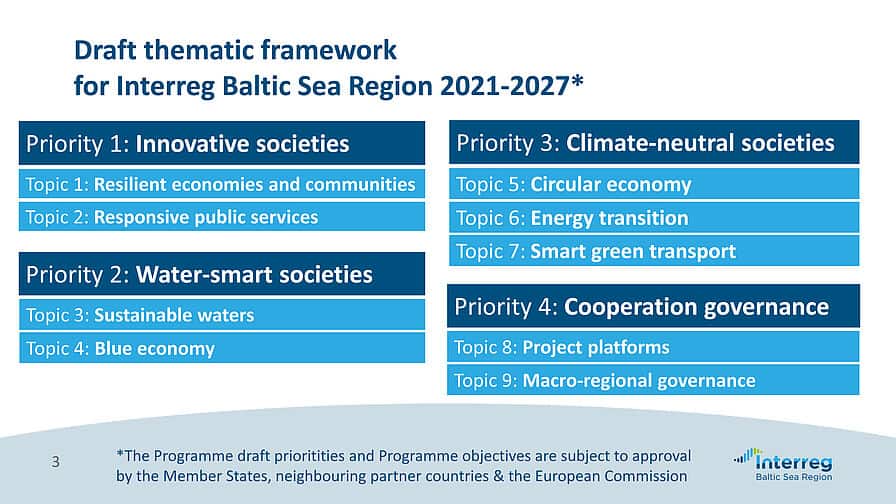The Interreg Baltic Sea Region Programme 2021-2027 will offer funding under four priorities: Innovative Societies, Water-Smart Societies, Climate-Neutral Societies and Cooperation Governance, covering nine Programme objectives altogether. Members of the Joint Programming Committee agreed on the thematic priorities and Programme objectives at the meeting held on 2-3 December 2020.

Preparations for Interreg Baltic Sea Region 2021-2027 on track
Delegations of eleven countries: EU members states and neighbouring partner countries from around the Baltic Sea, took several decisions to advance the preparations of Interreg Baltic Sea Region 2021-2027. Representatives of the European Commission and the Managing Authority/Joint Secretariat (MA/JS) held the observers’ position. The online meeting was chaired by Ms Iruma Kravale from the Latvian Ministry of Environmental Protection and Regional Development.
Progress in shaping the future Programme coincides with the very recent agreement on the Commission’s proposal for post-2020 European Territorial Cooperation programmes (Interreg) reached by the European Parliament and EU Member States.
The Programme’s priorities and objectives approved
After several months of work dedicated to reviewing strategic documents, consulting potential beneficiaries and discussing in the framework of the Joint Programming Committee, the Committee members reviewed the first comprehensive Programme draft document and agreed on the future Programme priorities and objectives. The Programme priorities will be aligned with two EU policy objectives for 2021–2027: a smarter Europe and a greener Europe as well as to the objective on cooperation governance.

Interreg Baltic Sea Region 2021-2027 draft thematic framework
New funding opportunities with simplified procedures
Cooperation in Interreg Baltic Sea Region projects is a unique opportunity to build on experiences of others in various fields, and to make great solutions become common practice across the region.
In order to reduce the administrative burden and increase the attractiveness of this funding scheme, the Joint Programming Committee members and the Managing Authority/Joint Secretariat plan simplification as a horizonal principle to be applied.
In practice, the Joint Programming Committee members agreed that the future Programme will offer several types of projects. This includes a new type of small projects that appear to be attractive to new beneficiaries who only enter the Interreg transnational setting with their smart ideas of how to shape the region.
Moreover, the Joint Programming Committee members discussed simplifications in procedures, for example the provisions for State Aid as well as for planning and reporting costs.
Next steps
Considering comments by Joint Programming committee members, the Managing Authority/Joint Secretariat, with support of the external consultancy company Ramboll, will prepare an updated draft of the Programme document for the next meeting of the Joint Programming Committee in February 2021.
After a very successful programming year under Latvian chairmanship, during which in particular the Programme content was discussed and agreed, the main open point related to the Programme document is the budget, which will be developed under Lithuanian chairmanship in 2021. The aim is to finalise the Programme document by mid of 2021 and to get it approved by the Commission until the end of 2021. At this time, also the launch of the first application round could be expected, if everything works out as planned.
Review of the current Programme’s implementation
Back-to-back with the meeting of the Joint Programming Committee, the Monitoring Committee meeting took place. The members reviewed the Programme implementation status, discussed the follow-up of audit results and the approach towards negative interests paid on Programme accounts.






